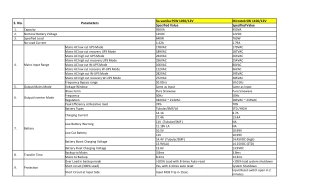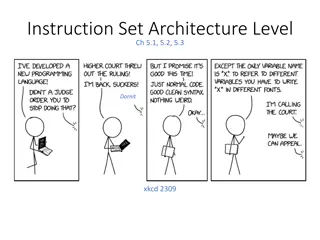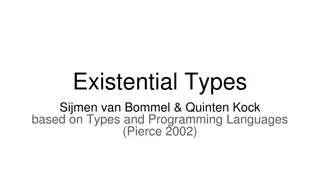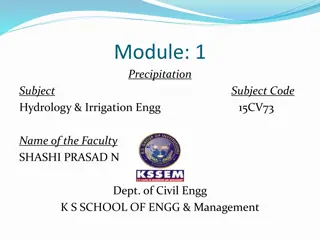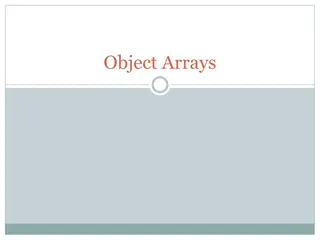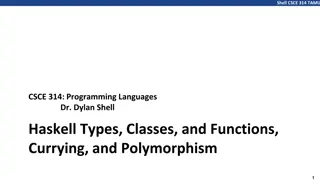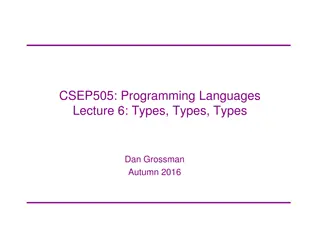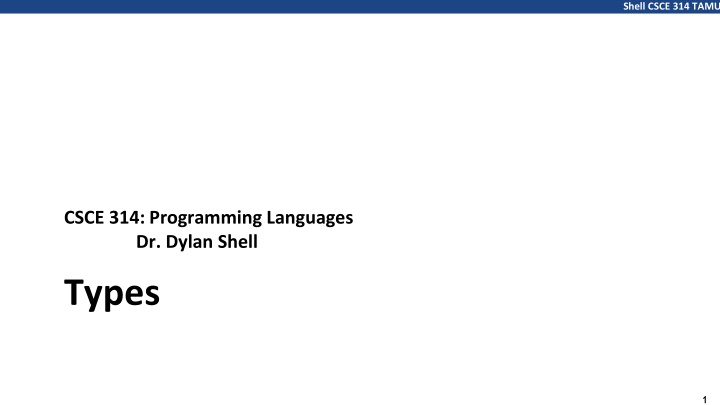
Names, Variables, Scopes, and Scoping in Programming
Explore the concepts of names, variables, scopes, and scoping in programming languages. Learn about name bindings, variable properties, static and dynamic bindings, scopes of names, lexical scoping, and dynamic scoping. Understand how names are bound to memory addresses, their types, values, lifetimes, and the impact of scopes on program areas.
Download Presentation

Please find below an Image/Link to download the presentation.
The content on the website is provided AS IS for your information and personal use only. It may not be sold, licensed, or shared on other websites without obtaining consent from the author. If you encounter any issues during the download, it is possible that the publisher has removed the file from their server.
You are allowed to download the files provided on this website for personal or commercial use, subject to the condition that they are used lawfully. All files are the property of their respective owners.
The content on the website is provided AS IS for your information and personal use only. It may not be sold, licensed, or shared on other websites without obtaining consent from the author.
E N D
Presentation Transcript
Shell CSCE 314 TAMU CSCE 314: Programming Languages Dr. Dylan Shell Types 1
Shell CSCE 314 TAMU Names Names refer to different kinds of entities in programs, such as variables, functions, classes, templates, modules, . . . . Names can be reserved or user-defined Names can be bound statically or dynamically Name bindings have a scope: the program area where they are visible 2
Shell CSCE 314 TAMU Variables Essentially, variables are bindings of a name to a memory address. They also have a type, value, scope, and lifetime Bindings can be dynamic (occur at run time), or static (occur prior to run time) What are the scopes of names here, when are variables bound to types and values, and what are their lifetimes? const int d = 400; void f() { double d = 100; { double d = 200; std::cout << d;} std::cout << d; } double g() { return d+1;} 3
Shell CSCE 314 TAMU Scope Scope is a property of a name binding The scope of a name binding are the parts of a program (collection of statements, declarations, or expressions) that can access that binding Static/lexical scoping Binding s scope is determined by the lexical structure of the program (and is thus known statically) The norm in most of today s languages Efficient lookup: memory location of each variable known at compile-time Scopes can be nested inner bindings hide the outer ones 4
Shell CSCE 314 TAMU Lexical Scoping namespace std { ... } namespace N { void f(int x) {}; class B { void f (bool b) { if (b) { bool b = false; // confusing but OK std::cout << b; } } }; } 5
Shell CSCE 314 TAMU Dynamic Scoping Some versions of LISP have dynamic scoping Variable s binding is taken from the most recent declaration encountered in the execution path of the program Macro expansion of the C preprocessor gives another example of dynamic scoping Makes reasoning difficult. For example, #define ADD_A(x) x + a void add_two(int *x) { const int a = 2; x = ADD_A(x); } void add_one(int *x) { const int a = 1; x = ADD_A(x); } 6
Shell CSCE 314 TAMU l- and r-values Depending on the context, a variable can denote the address (l-value), or the value (r-value) int x; x = x + 1; Some languages distinguish between the syntax denoting the value and the address, e.g., in ML x := !x + 1 From type checking perspective, l- or r-valueness is part of the type of an expression 7
Shell CSCE 314 TAMU Lifetime Time when a variable has memory allocated for it Scope and lifetime of a variable often go hand in hand A variable can be hidden, but still alive void f (bool b) { if (b) { bool b = false; // hides the parameter b std::cout << b; } } A variable can be in scope, but not alive A* a = new A(); A& aref = *a; delete a; std::cout << aref; // aref is not alive, but in scope 8
Shell CSCE 314 TAMU Variable-Type Binding Types can be bound to variables statically or dynamically Static: string x = Hi ; x = 1.2; // error Dynamic: string x = Hi ; x = 1.2; // OK Static binding may or may not require annotations let x = 5 x = 5.5 error in x + 1 9
Shell CSCE 314 TAMU Types and Type Systems Types are collections of values (with operations that can apply to them) At the machine level, values are just sequences of bits Is this 0100 0000 0101 1000 0000 0000 0000 0000 floating point number 3.375? integer 1079508992? two short integers 16472 and 0? four ASCII characters @ X NUL NUL? Programming at machine-level (assembly) requires that programmer keeps track of what are the types of each piece of data Type errors (attempting an operation on a data type for which the operation is not defined) hard to avoid Goal of type systems is to enable detection of type errors reject meaningless programs 10
Shell CSCE 314 TAMU Languages with some type system, but unsound C, C++, Eiffel Reject most meaningless programs: int i = 1; char* p = i; but allow some: union { char* p; int i; } my_union; void foo() { my_union.i = 1; char* p = my_union.p; . . . } 11
Shell CSCE 314 TAMU Sound Type System: Java, Haskell Reject some meaningless programs at compile-time: Int i = Erroneous ; Add checks at run-time so that no program behavior is undefined interface Stack { void push(Object elem); Object pop(); } class MyStack { . . . } Stack s = new MyStack(); s.push(1); s.push( whoAreYou ); Int i = (Int) s.pop(); // throws an exception 12
Shell CSCE 314 TAMU Dynamic (but Sound) Type System Scheme, Javascript Reject no syntactically correct programs at compile- time, types are enforced at run-time: (car (cons 1 2)) ; ok (car 5) ; error at run-time Straightforward to define the set of safe programs and to detect unsafe ones 13
Shell CSCE 314 TAMU Type Systems Common errors -- examples of operations that are outlawed by type systems: Add an integer to a function Assign to a constant Call a non-existing function Access a private field Type systems can help: in early error detection in code maintenance in enforcing abstractions in documentation in efficiency 14
Shell CSCE 314 TAMU Type Systems Terminology Static vs. dynamic typing Whether type checking is done at compile time or at run time Strong vs. weak typing Sometimes means no type errors at run time vs. possibly type errors at run time (type safety) Sometimes means no coercions vs. coercions (implicit type conversion) Sometimes even means static vs. dynamic 15
Shell CSCE 314 TAMU Type Systems Terminology (Cont.) Type inference Whether programmers are required to manually state the types of expressions used in their program or the types can be determined based on how the expr s are used E.g., C requires that every variable be declared with a type; Haskell infers types based on a global analysis 16
Shell CSCE 314 TAMU Type Checking in Language Implementation 17
Shell CSCE 314 TAMU Let s step back and look at some theory... 18
Shell CSCE 314 TAMU Chomsky Hierarchy Four classes of grammars that define particular classes of languages 1.Regular grammars 2.Context free grammars 3.Context sensitive grammars 4.Phrase-structure (unrestricted) grammars Ordered from less expressive to more expressive (but harder to parse) Regular grammars and CF grammars are of interest in theory of programming languages 19
Shell CSCE 314 TAMU Regular Grammar Productions are of the form A aB or A a where A, B are nonterminal symbols and a is a terminal symbol. Can contain S . Example regular grammar G = ({A, S}, {a, b, c}, S, P), where P consists of the following productions: S aA A bA | cA | a G generates which words? 20
Shell CSCE 314 TAMU Regular Grammar Productions are of the form A aB or A a where A, B are nonterminal symbols and a is a terminal symbol. Can contain S . Example regular grammar G = ({A, S}, {a, b, c}, S, P), where P consists of the following productions: S aA A bA | cA | a The language L(G) is given by regular a expression: a(b+c)*a G generates the following words aa, aba, aca, abba, abca, acca, abbba, abbca, abcba, 21
Shell CSCE 314 TAMU Regular Languages The following three formalisms all express the same set of (regular) languages: 1. Regular grammars 2. Regular expressions 3. Finite state automata Not very expressive. For example, the language L = { anbn| n >= 1 } is not regular. Question: Can you relate this language L to (parsing) programming languages? 22
Shell CSCE 314 TAMU Finite State Automata A finite state automaton M=(S, I, f, s0, F) consists of: a finite set S of states a finite set of input alphabet I a transition function f: S I S that assigns to a given current state and input the next state of the automaton an initial state s0,and a subset F of S consisting of accepting (or final) states 23
Shell CSCE 314 TAMU Finite State Automata A finite state automaton M=(S, I, f, s0, F) consists of: a finite set S of states a finite set of input alphabet I a transition function f: S I S that assigns to a given current state and input the next state of the automaton an initial state s0,and a subset F of S consisting of accepting (or final) states Example: 1. Regular grammar 3. FSA S aA A bA | cA | a 2. Regular expression a(b+c)*a b a a F A S c 24
Shell CSCE 314 TAMU Chomsky Hierarchy Four classes of grammars that define particular classes of languages 1.Regular grammars 2.Context free grammars 3.Context sensitive grammars 4.Phrase-structure (unrestricted) grammars Ordered from less expressive to more expressive (but harder to parse) Regular grammars and CF grammars are of interest in theory of programming languages 25
Shell CSCE 314 TAMU Context Free Grammar Productions are of the form A BC or A B or A a where A, B, C are nonterminal symbols and a is a terminal symbol. Can contain S . (There are other equiv. definitions.) Example cfg G = ({A, B, C, S}, {a, b}, S, P), where P consists of the following productions: S AC C SB A a B b G generates which words? 26
Shell CSCE 314 TAMU Formally, the syntax of such expressions is defined by the following context free grammar: expr term '+' expr | term term factor '*' term | factor factor digit | '(' expr ') digit '0' | '1' | | '9' 27
Shell CSCE 314 TAMU However, for reasons of efficiency, it is important to factorize the rules for expr and term: expr term ('+' expr | ) term factor ('*' term | ) Note: The symbol denotes the empty string. 28
Shell CSCE 314 TAMU It is now easy to translate the grammar into a parser that evaluates expressions, by simply rewriting the grammar rules using the parsing primitives. That is, we have: expr term ('+' expr | ) term factor ('*' term | ) expr :: Parser Int expr = do t term do char '+' e expr return (t + e) +++ return t 29
Shell CSCE 314 TAMU term :: Parser Int term = do f factor expr term ('+' expr | ) term factor ('*' term | ) do char '*' t term return (f * t) +++ return f factor :: Parser Int factor = do d digit return (digitToInt d) +++ do char '(' e expr char ')' return e 30
Shell CSCE 314 TAMU Chomsky Hierarchy Four classes of grammars that define particular classes of languages 1.Regular grammars 2.Context free grammars 3.Context sensitive grammars 4.Phrase-structure (unrestricted) grammars Ordered from less expressive to more expressive (but harder to parse) Regular grammars and CF grammars are of interest in theory of programming languages 31
Shell CSCE 314 TAMU Type Checking in Language Implementation 32
Shell CSCE 314 TAMU Type Checking CF grammars can capture a superset of meaningful programs Type checking makes this set smaller (usually to a subset of meaningful programs) What kind of safety properties CF grammars cannot express? Variables are always declared prior to their use Variable declarations unique As CF grammars cannot tie a variable to its definition, must parse expressions untyped, and type-check later Type checker ascribes a type to each expression in a program, and checks that each expression and declaration is well-formed 33
Shell CSCE 314 TAMU Typing Relation By expression t is of type T , it means that we can see (without having to evaluate t) that when t is evaluated, the result is some value t of type T All of the following mean the same t is of type T , t has type T , type of t is T , t belongs to type T Notation: t : T or t T or t :: T (in Haskell) more commonly, t : T where is the context, or typing environment What are the types of expression x+y below? float f(float x, float y) { return x+y; } int g(int x, int y) { return x+y; } 34
Shell CSCE 314 TAMU Typing Relation By expression t is of type T , it means that we can see (without having to evaluate t) that when t is evaluated, the result is some value t of type T All of the following mean the same t is of type T , t has type T , type of t is T , t belongs to type T Notation: t : T or t T or t :: T (in Haskell) more commonly, t : T where is the context, or typing environment What are the types of expression x+y below? float f(float x, float y) { return x+y; } int g(int x, int y) { return x+y; } x : float, y : float x : int, y : int x+y : float x+y : int 35
Shell CSCE 314 TAMU Type Checker as a Function Type checker is a function that takes a program as its input (as an AST) and returns true or false, or a new AST, where each sub-expression is annotated with a type, function overloads resolved, etc. Examples of different forms of type checking functions: checkStmt :: Env -> Stmt -> ( Bool, Env ) checkExpr :: Env -> Expr -> Type 36
Shell CSCE 314 TAMU Equivalence of types isn t trivial Are the types of a, b, and c the same? 37
Shell CSCE 314 TAMU Equivalence of types isn t trivial Are the types of a, b, and c the same? Nominal vs. structural equivalence. 38
Shell CSCE 314 TAMU Composite types The examples above, and the union types are examples of composite types. Typically programming languages offer basic types that are directly supported by common processors char, int, float, ... Additionally, languages offer type operators and ways to define type operators (ways to construct types from more primitive types) Haskell: data, lists, tuples, -> C++: class, arrays, unions The selection of type operators varies among languages and also on which of the operators are built-in, which can be implemented as libraries 39
Shell CSCE 314 TAMU Composite types Haskell s data construct defines a variant or discriminated union type data Contact = Email String | Address Street Zip Town| Tel String The type system guarantees statically that Email data can t be treated as Tel data C s union types leaves tracking the kind of value stored to a union to programmer s responsibility void foo() { my_union.i = 1; char* p = my_union.p; . . . } union { char* p; int i; } my_union; 40
Shell CSCE 314 TAMU Defining a Type System Informal rules in some natural language Using some formal language Implementation 41
Shell CSCE 314 TAMU Defining a Type System with Informal Rules Example Type Rules All referenced variables must be declared All declared variables must have unique names The + operation must be called with two expressions of type int, and the resulting type is int 42
Shell CSCE 314 TAMU Defining a Type System with Informal Rules Example Type Check Statement Skip is always well-formed An assignment is well-formed if its target variable is declared, its source expression is well-formed, and the declared type of the target variable is the same as the type of the source expression A conditional is well-formed if its test expression has type bool, and both then and else branches are well-formed statements 43
Shell CSCE 314 TAMU Defining a Type System with Informal Rules Example Type Check Statement (Cont.) A while loop is well-formed if its test expression has type bool, and its body is a well-formed statement A block is well-formed if all of its statements are well-formed A variable declaration is well-formed if the variable has not already been defined in the same scope, and if the type of the initializer expression is the same as the type of the variable 44
Shell CSCE 314 TAMU Defining a Type System Using Formal Language Common way to specify type systems is using natural deduction style rules inference rules A1 . . . An ___________ B Example: A B A B A ______ , _________ B B 45
Shell CSCE 314 TAMU Type Rules Example A conditional is well-formed if its test expression has type bool, and both then and else branches are well- formed statements e:bool s1:ok s2:ok if e s1 s2:ok ____________________________________ 46

